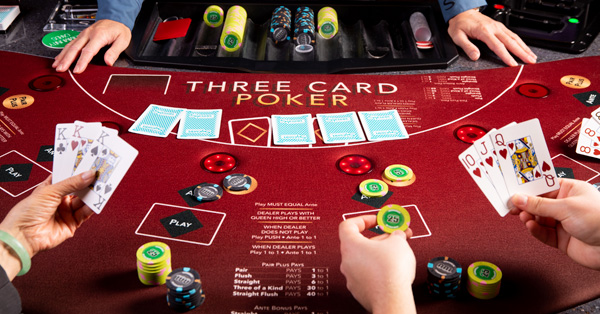When it comes to card games, poker stands out as a classic favorite, renowned for its blend of luck, strategy, and psychological cunning. Entering the world of poker can initially seem daunting with its myriad of rules, combinations, and betting strategies. However, understanding the fundamentals can greatly enhance your playing experience and increase your chances of success. This guide aims to demystify the essential rules of poker, delve into the various card combinations, and offer practical tips to help novice and experienced players alike navigate the thrilling twists and turns of the game. Whether you’re gearing up for a friendly home game or aspiring to compete in high-stakes tournaments, mastering these basics is your first step toward becoming a more confident and skilled poker player.
What is poker?
Poker is a popular card game that combines strategy, skill, and a bit of luck. It involves players betting on the value of their cards, with the aim of having the best hand or convincing others to fold. This game has been a staple in casinos and home games for decades, captivating players with its depth and complexity. Understanding how to win in poker often requires not just knowing the rules but also mastering the art of reading opponents and making calculated bets.
Different Types of Poker
Poker isn’t just one game but a family of card games that share betting rules and hand rankings. The most common variations include Texas Hold’em, Omaha, Seven-Card Stud, and Razz. Each type has unique rules and strategies, making poker a versatile and endlessly fascinating game. For beginners, Texas Hold’em is often the starting point due to its straightforward rules and the prominence of this variant in both home games and professional tournaments. Understanding poker straight rules is essential for determining the strength of your hand and knowing when to bet aggressively.
Texas Hold’em
In Texas Hold’em, each player is dealt two private cards and must make the best hand possible using five community cards. This game is renowned for its strategic depth, and the best Texas Hold’em hands can often determine the outcome of a game. Understanding the best poker starting hands is crucial in this variant.
Omaha
Omaha is similar to Texas Hold’em but with a key difference: each player receives four private cards and must use exactly two of them along with three community cards to make a hand. This game requires a strong grasp of hand combinations and can lead to some exciting and high-scoring hands. If you’re new to poker, starting with easy poker games like free online versions or home games can help you practice without financial risk.
Seven-Card Stud
Seven-Card Stud does not use community cards. Instead, each player receives seven cards, three down and four up, and must make the best five-card hand. This game is more about reading opponents and understanding their possible hands, as there is less hidden information compared to Texas Hold’em. Some of the best Texas Hold’em hands include pocket aces and pocket kings, which give you a strong advantage before the flop.
Razz
Razz is a form of Seven-Card Stud where the goal is to make the lowest possible hand. Straights and flushes don’t count against you, and the best possible hand is A-2-3-4-5. This game flips the usual hand rankings on their head and requires a different strategic approach. Many online platforms offer easy poker games that are perfect for beginners to practice their skills and understand the flow of the game.

The Main Rules of the Game
Regardless of the type of poker, the main rules of the game involve several core components:
- The Deal: Cards are dealt to players based on the specific poker variant being played.
- Betting Rounds: Players take turns betting, folding, or raising based on the strength of their hands.
- Showdown: After the final betting round, players reveal their hands, and the best hand wins the pot.
In poker, understanding the poker betting rules is essential. Players can bet, call, raise, or fold depending on their position and the strength of their hand. Knowing when to bet or fold is a critical skill for success in poker. When figuring out how to play poker in a casino, it’s important to understand the structure of the game, the betting rounds, and the various strategies used by experienced players.
Tips for Players Who Play for the First Time
- Learn the Rules: Start with understanding the rules of the variant you are playing. Texas Hold’em is a good starting point.
- Practice: Use free online poker games or apps to practice without risking money.
- Start Small: When you’re ready to play for real money, start with low-stakes games to get a feel for the live action.
- Observe: Watch other players and learn from their strategies.
- Stay Calm: Poker can be stressful, but maintaining a calm demeanor will help you make better decisions. To learn how to play poker in a casino, start by familiarizing yourself with the basic rules and etiquette of the game.
For beginners, learning the basic poker terms is also beneficial. Familiarize yourself with terms like “blinds,” “flop,” “turn,” and “river” to understand the flow of the game better. Knowing the best Texas Hold’em hands can significantly increase your chances of winning by allowing you to make better pre-flop decisions.

Overview of Combinations
Poker hand combinations are ranked based on their rarity and the probability of being dealt. Here is a brief overview of the common poker hand rankings, from highest to lowest:
- Royal Flush: A, K, Q, J, 10, all of the same suit.
- Straight Flush: Five consecutive cards of the same suit.
- Four of a Kind: Four cards of the same rank.
- Full House: Three cards of one rank and two cards of another rank.
- Flush: Five cards of the same suit, not in sequence.
- Straight: Five consecutive cards of different suits.
- Three of a Kind: Three cards of the same rank.
- Two Pair: Two cards of one rank and two cards of another rank.
- One Pair: Two cards of the same rank.
- High Card: The highest card in your hand when no other combination is made.
Understanding these combinations is crucial for determining the strength of your hand and making strategic decisions during the game. There are different types of poker games, such as Texas Hold’em, Omaha, and Seven-Card Stud, each offering unique challenges and strategies.
Combinations and Their Hierarchy
Each combination in poker has a specific hierarchy that determines which hand wins in a showdown. For example, a Royal Flush is the highest possible hand and beats all other combinations. On the other hand, a High Card hand is the lowest and only wins if no one else has made a pair or better.
The poker straight rules are particularly important in understanding hand rankings. A straight consists of five consecutive cards of different suits, and it beats hands like Three of a Kind and Two Pair but loses to a Flush.
What Words Are Used in Poker
Poker has its own unique vocabulary that players must understand to communicate effectively during the game. Here are some essential poker terms for beginners:
- Blinds: Forced bets posted by players to the left of the dealer button.
- Flop: The first three community cards dealt face-up.
- Turn: The fourth community card dealt face-up.
- River: The fifth and final community card dealt face-up.
- All-In: Betting all of your remaining chips.
- Check: Passing the action to the next player without betting.
- Raise: Increasing the current bet.
Learning these terms will help new players follow the action and make informed decisions during the game.

Rules of Betting and Analysis of Opponents’ Bets
Betting is a critical part of poker, and understanding the poker betting rules can give players an edge. There are different types of bets, such as:
- Bet: The initial wager made during a betting round.
- Call: Matching the current bet made by another player.
- Raise: Increasing the current bet amount.
- Fold: Discarding your hand and forfeiting the current pot.
Analyzing opponents’ bets is equally important. Pay attention to betting patterns, as they can reveal a lot about the strength of an opponent’s hand. For example, a large bet might indicate a strong hand, while a small bet could be a bluff or a weak hand. Developing this analytical skill takes practice and experience. Exploring different types of poker games can help you find the variant that suits your playing style and keeps the game interesting.
Practice and Continuous Improvement of Skills
To become proficient in poker, continuous practice and improvement are essential. Here are some tips to help you improve:
- Play Regularly: The more you play, the better you will understand the game.
- Study: Read books, watch videos, and follow professional players to learn advanced strategies.
- Review Your Play: After each session, review your hands and decisions to identify mistakes and areas for improvement.
- Join a Community: Engage with other players in forums or poker groups to share tips and experiences.
- Stay Updated: Poker strategies evolve, so staying informed about new techniques and trends is crucial.
Playing easy poker games like free online versions can also help you practice without financial risk. This way, you can experiment with different strategies and get comfortable with the game mechanics.
Summarizing the Basic Rules and Tips for Successful Poker Play
Poker is a game that blends luck, skill, and psychology. To summarize, here are the basic rules and tips for successful poker play:
- Understand the Game: Learn the rules and hand rankings of the variant you’re playing.
- Start with Texas Hold’em: It’s the most popular and a great starting point for beginners.
- Know the Combinations: Familiarize yourself with the hand rankings and the hierarchy of combinations.
- Learn the Vocabulary: Understanding common poker terms will help you follow the game and communicate effectively.
- Master Betting Rules: Knowing when and how to bet is crucial for winning.
- Analyze Opponents: Pay attention to betting patterns and behaviors to gain insights into opponents’ hands.
- Practice Regularly: Continuous practice is key to improving your skills.
- Stay Calm and Patient: Poker requires patience and a calm mindset to make strategic decisions.
Whether you’re playing in a casino or at home with friends, these tips and rules will help you navigate the game and increase your chances of success. Remember, poker is not just about the cards you hold but also about how you play them and read your opponents. Learning poker terms for beginners, like blinds, flop, turn, and river, will help you follow the action and communicate effectively at the table.
By following these guidelines and continuously honing your skills, you’ll be well on your way to understanding how to win in poker and enjoying the thrill and challenge of this timeless card game.

